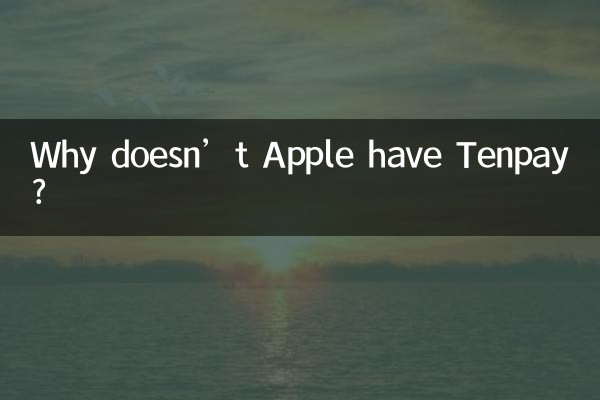Why doesn’t Apple have Tenpay?
In recent years, mobile payment has become one of the important payment methods worldwide. In China, Alipay and WeChat Pay (Tenpay) almost monopolize the market, while Apple's Apple Pay has a relatively small share of the Chinese market although it has a certain influence globally. So, why hasn’t Apple launched a service similar to Tenpay? This article will analyze this issue from multiple angles and present you with a structured analysis report based on hot topics and hot content in the past 10 days.
1. Global mobile payment market structure

The following is a comparison of user scale and market share of major global mobile payment platforms (data source: Statista, latest statistics in 2023):
| Payment platform | Number of users (100 million) | market share(%) | main market |
|---|---|---|---|
| Alipay | 13 | 45 | China |
| WeChat Pay (Tenpay) | 11 | 38 | China |
| Apple Pay | 5 | 10 | Global (mainly Europe and America) |
| Google Pay | 3 | 5 | Global (mainly India) |
As can be seen from the table, Alipay and WeChat Pay have an absolute advantage in the Chinese market, while Apple Pay performs more prominently in other parts of the world. The formation of this market structure is closely related to the payment habits, policy environment and technological development of various countries.
2. Analysis of the reasons why Apple did not launch Tenpay
1.Market strategy differences: Apple prefers to provide integrated services of hardware and ecosystem rather than an independent payment platform. Apple Pay is essentially a payment tool based on NFC technology, rather than a comprehensive financial platform like Tenpay.
2.Policy and regulatory restrictions: In China, financial services have high entry barriers and require multiple licenses. Tenpay and Alipay were able to develop rapidly thanks to early policy support and localized operations. As a foreign-invested enterprise, Apple faces stricter regulatory requirements.
3.User habits and competitive landscape: Chinese users have formed the habit of using Alipay and WeChat Pay. These two platforms not only provide payment services, but also cover social networking, life services and other functions. If Apple wants to enter this market, it needs to invest a lot of resources to compete with local giants.
4.Different technical routes: Tenpay relies on the social attributes of WeChat, while Apple Pay focuses more on integration with hardware such as iPhone and Apple Watch. There are essential differences in the technical routes and business models of the two.
3. Hot topics and content in the past 10 days
The following are hot topics related to mobile payment in the past 10 days (data source: Baidu Index, Weibo hot searches):
| Ranking | topic | heat index | Main discussion points |
|---|---|---|---|
| 1 | Digital RMB pilot expanded | 1,200,000 | Application scenarios and future prospects of digital RMB |
| 2 | WeChat payment fee adjustment | 980,000 | The impact of rising merchant fees on small and micro enterprises |
| 3 | Apple Pay adds support for banks | 650,000 | Apple Pay’s slow expansion in China |
| 4 | Alipay’s “face-based payment” security issues | 550,000 | The balance between user privacy and payment security |
As can be seen from the table, digital renminbi and WeChat payment fee adjustments are the topics that have attracted the most attention recently, while discussions about Apple Pay are relatively low. This also reflects Apple Pay’s limited influence in the Chinese market.
4. Apple’s future possibilities
Although Apple currently has no plans to launch something similar to Tenpay, its layout in the financial field is still gradually advancing. For example:
1.Apple Card promotion: The credit card service launched by Apple and Goldman Sachs has been launched in some countries and may be expanded to more regions in the future.
2.Digital RMB Cooperation: As China’s digital renminbi pilot expands, Apple may seek official cooperation to integrate Apple Pay with the digital renminbi.
3.Deepening of hardware ecology: Apple may further take advantage of its hardware advantages, such as expanding more payment scenarios through the iPhone's NFC function.
5. Conclusion
Apple has not launched a service similar to Tenpay, mainly due to the combined effect of multiple factors such as market strategies, policy restrictions, and user habits. In the short term, Apple is more likely to increase its influence in the Chinese payment market through the gradual expansion and technological innovation of Apple Pay, rather than directly challenging the dominance of Alipay and WeChat Pay.
In the future, with the popularization of digital renminbi and the evolution of global payment technology, it remains to be seen whether Apple will adjust its strategy and launch financial services more in line with the Chinese market.

check the details

check the details